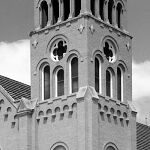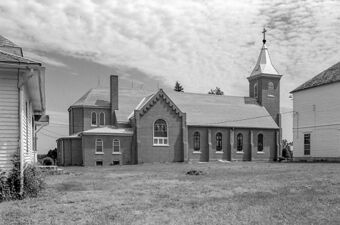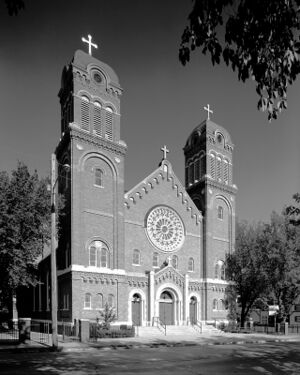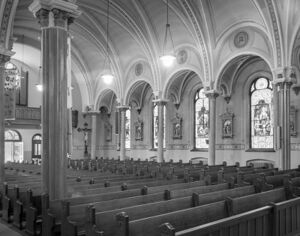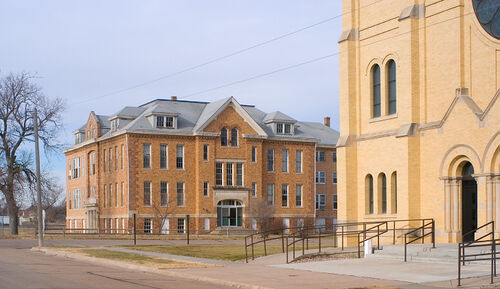Difference between revisions of "Jacob M. (James) Nachtigall (1874-1947), Architect"
m (→Professional Associations) |
m (→Professional Associations) |
||
| Line 25: | Line 25: | ||
1914-1916: associated with [[Br. Leonard (Lawrence) Darscheidt, O. F. M. (1858-1944), Architect]], St. Joseph Parish Church.[[#Notes|[a]]] | 1914-1916: associated with [[Br. Leonard (Lawrence) Darscheidt, O. F. M. (1858-1944), Architect]], St. Joseph Parish Church.[[#Notes|[a]]] | ||
| − | + | [[Image:DM200312 008 1117 11w.jpg|thumb|center|upright=2.5|alt=DM200312 008 1117 11w.jpg|St. Anthony Parochial School (1911, 1926), Cedar Rapids, Nebraska; view from the church. (''D. Murphy'')]] | |
| − | [[Image:DM200312 008 1117 11w.jpg|thumb|center|upright=2.5|alt=DM200312 008 1117 11w.jpg|St. Anthony Parochial School (1911, 1926), Cedar Rapids, Nebraska; view from the church.]] | + | |
==Buildings & Projects== | ==Buildings & Projects== | ||
Revision as of 08:29, 19 October 2015
DBA: J. M. Nachtigal
This page is a contribution to the publication, Place Makers of Nebraska: The Architects. See the format and contents of Nebraska architect entries page for details on the compilation and organization of the entries.
Contents
Compiled Directory Listings
Omaha, Nebraska, 1909-18, 1920-21, 1923, 1925-26, 1928-29, 1931-40, 1940-45
Professional Associations
1898-1899: draftsman, Trans-Mississippi & International Exposition (Walker & Kimball, Architects)
1900-1908: draftsman, Thomas Rogers Kimball (1862-1934), Architect, Omaha.
1909-1945: principal, J. M. Nachtigall, Architect, Omaha.
1914-1916: associated with Br. Leonard (Lawrence) Darscheidt, O. F. M. (1858-1944), Architect, St. Joseph Parish Church.[a]
Buildings & Projects
St. Leonards Catholic Church (1902-1913), Madison, Nebraska. National Register narrative
St. Anthony’s Catholic Church (1905, 1914), rural West Point, Nebraska. (CM00-003)
Catholic School (1908), 206 Ash, Snyder, Nebraska. (DD11-006)
Driscoll Leather Company (1910), 714 S. 15th Street, Omaha, Nebraska.[8] (DO09:0121-078)
West Point City Auditorium (1910-1912), 237 N Main, West Point, Nebraska.[7] (CM05-046) National Register narrative
Church (1911), 1470 S. 13th St., Omaha, Nebraska.[8] (DO09:0115-089)
St. Anthony’s Catholic School (1911, 1926), nw cor 6th & Main, Cedar Rapids, Nebraska.[7] (BO04-024) National Register narrative
Leo A. Hoffman Mortuary (1912), 102 S 24th St, Omaha, Nebraska.[6:55][8] (DO09:0209-005)
Dr. B. M. Riley House (1912), 3564 Poppleton, Omaha, Nebraska.[6:165][8] (DO09:0204-013)
Immaculate Conception Parish School and Convent (1912-1913), 2708 S 24th St., Omaha, Nebraska.[7][10][e] (DO09:0195-002) See the National Register narrative.
Building (1913), 1711 Cuming St., Omaha, Nebraska.[8] (DO09:0130-041)
Cesky Kostel Nanebejzeti Panny Marie, aka St Mary of the Assumption Catholic Church (1914-15), Dwight, Nebraska. (BU06-001.01) National Register narrative
St. Anthony’s Catholic School (1914), rural West Point, Nebraska. (CM00-003)
St. Josephs Parish Church (1914-1916), 1730 S 16th, Omaha, Nebraska.[7][11][a] (DO09:0116-003) Collaborating with principal designer, Br. Leonard (Lawrence) Darscheidt, O. F. M. (1858-1944), Carpenter-Architect. See the National Register narrative.
Building for H. Rohlff/Twin Cities Welding & Parts, aka Rohlff Theater (1915), 2559 Leavenworth, Omaha, Nebraska.[6:141][8] (DO09:0205-013)
St. Anthony’s Catholic Church (1916-1919), Cedar Rapids, Nebraska.[7] (BO04-024)
St. Ann's Catholic Church (1917), 2247 Poppleton, Omaha, Nebraska.[14]
Ecclesia St. Bonaventure Catholic Church (1917-1919), Raeville, Nebraska.[7] (BO09-001) National Register narrative
Assumption Catholic Church (1919-22; destroyed by fire, October 19, 1945), rural Juniata, Nebraska.[5]
St. Francis Chapel and addition to St. Elizabeth's Hospital (1920-1921), 12th & South, Lincoln, Nebraska.[13][d] (LC13:C05-128)
St. John’s Catholic Church, Addition and Rectory (1920-1923), 2500 California St, Omaha, Nebraska.[8] (DO09:0213-001)
St. Michael's Catholic Church Convent (1926-27), Spalding, Nebraska. (GY06-001)
Immaculate Conception Catholic Church (1926-1927), 2708 S 24th St, Omaha, Nebraska.[2][3][8][10][15:549-50] National Register narrative
Father Flanagan's House (1926-27), Boys Town, Nebraska.[7][8] (DO02-001)/(DO09:1218-001)
St. Joseph Parish School (1928-1930), 16th & Center/1730 S 16th St., Omaha, Nebraska.[4][7][8][11][15:539] (DO09:0116-003) See the National Register narrative.
Undated
Duchesne Academy, 3601 Burt St., Omaha, Nebraska.[2][5][7][12][c] (DO09:0323-003)
South Side Terrace Homes, Omaha Housing Authority, Omaha, Nebraska.[1]
St. James' Orphanage, 60th & Military, Omaha, Nebraska.[2] See the Nebraska Memories website for a lantern slide of the building in the Omaha Public Library collection.
Our Lady of Lourdes Church, Omaha, Nebraska.[2]
St. Patrick's Catholic Church, Sidney, Nebraska.[?]
St. Joseph’s Memorial Hospital, Omaha, Nebraska.[2]
Notes
a. Nachtigall’s collaboration with Darscheid on the St. Joseph's Church is from City of Omaha, Building Permit, cited in Bjorkman, 1986.[11] Hagedorn states, “After deliberation Fr. Pacific concluded first to finish the church. November 30, 1913, Brother Loenard Darscheidt, O. F. M., arrived from Hermann, Missouri, to make the preliminary arrangements and left again in December. In March, 1915, Brother Leonard returned with the plans, and after consultation with Mr. Jacob M. Nachtigall, a prominent architect and parishioner, modified and completed them. The plans and specifications were submitted to six contractors on April 17, 1915.”[15:537]
b. “James” is used by the architect in his application for AIA membership.[9]
c. Nachtigall takes credit for Duchesne Academy in several sources, but it is presently unclear about which part of the complex he designed. The original building dates to about 1883, before Nachtigall is known to have been in practice. Subsequent additions were made to the south in 1887, a new chapel by Thomas R. Kimball in 1910, an addition to the northwest corner of the original building in 1920, and a new south wing in 1931.[12]
d. The chapel and the hospital addition were all one construction. The addition included four floors of hospital rooms, porches, support spaces, with the chapel attached to the south wall of the hospital wing. Only the chapel is still extant; its north entrance facade is of new construction, as its original north wall was part of the south wall of the hospital wing.[13]
e. Hagedorn [15:549] states that it was a combined school and convent.
References
1. "Housing in Omaha, Nebraska, 1939-40: So. Side Terrace & Logan Fontanelle Homes Add'n," Omaha Housing Authority Annual Report, 1939-40. Filed Nebraska State Historical Society Collections Department.
2. Obituary, Omaha World-Herald (June 1, 1947): 23A:5.
3. The True Voice (October 29, 1926): 3; cornerstone; The True Voice (July 29, 1927): 1 (dedication).
4. The True Voice (May 18, 1928): 3 (dedication).
5. Minden Courier (May 10, 1983).
6. Landmarks, Inc., An Inventory of Historic Omaha Buildings. Omaha: Landmarks Heritage Presrvation Commission, 1980.
7. Listed in the National Register of Historic Places (NRHP).
8. City of Omaha Planning Department, Landmarks Heritage Preservation Commission, Database, Query on Architects, May 20, 2002; courtesy of Lynn Meyer, Preservation Planner.
9. AIA Historical Directory of American Architects: A Resource Guide to Finding Information About Past Architects. http://communities.aia.org/sites/hdoaa/wiki/Wiki%20Pages/ahd1032044.aspx Accessed June 1, 2010
10. Esser, Sarah, with Melissa Dirr. “Immaculate Conception Church and School,” National Register of Historic Places Registration Form. Omaha: Omaha City Planning Department, December, 1997.
11. Bjorkman, Lynn. "St Joseph Parish Church Complex (DO09:0116-003)," National Register of Historic Places, Inventory-Nomination Form. Omaha: Omaha City Planning Department, April, 1986.
12. Cummins, H. J. "Duchesne Academy: French Nuns Opened Girls' School," Omaha World-Herald, Metro Extra (September 25, 1985).
13. City of Lincoln, Building permit #9294, August 21, 1920 (courtesy, Edward F. Zimmer).
14. St. Ann's New Church and Rectory: A Day of Dedication, December 15, 1957, 4-5.
15. Eugene Hagedorn, O. F. M. The Franciscans in Nebraska. Humphrey, Nebraska: Humphrey Democrat and Norfolk Daily News, 1931.
Page Citation
D. Murphy, “Jacob M. (James) Nachtigall (1874-1947), Architect,” in David Murphy, Edward F. Zimmer, and Lynn Meyer, comps. Place Makers of Nebraska: The Architects. Lincoln: Nebraska State Historical Society, December 17, 2012. http://www.e-nebraskahistory.org/index.php?title=Place_Makers_of_Nebraska:_The_Architects Accessed, January 29, 2026.
Contact the Nebraska State Historic Preservation Office with questions or comments concerning this page, including any problems you may have with broken links (see, however, the Disclaimers link at the bottom of this page). Please provide the URL to this page with your inquiry.
